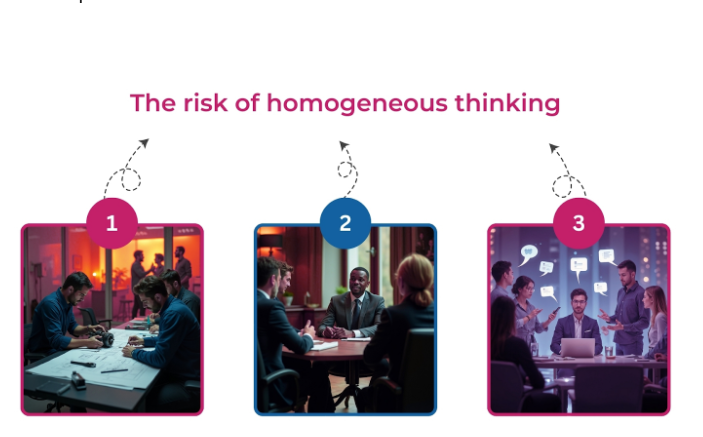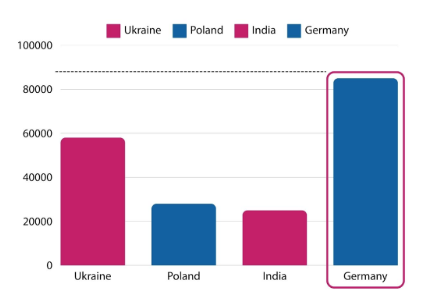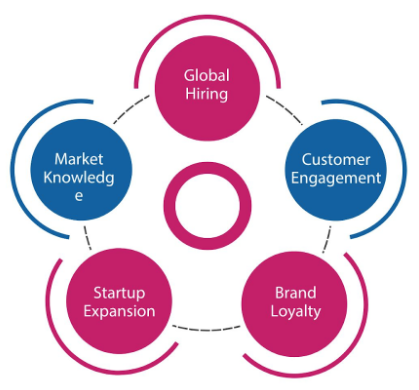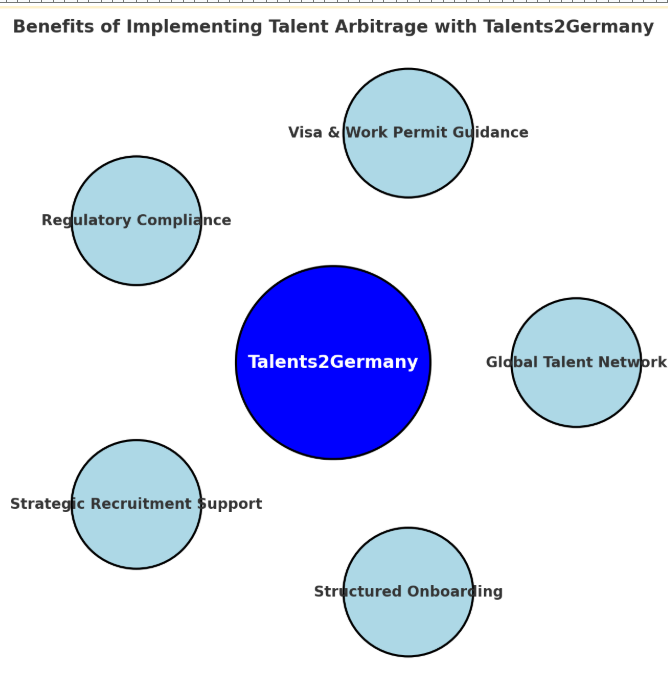Why German Startups Need International Talent to Stay Competitive
While Silicon Valley has long relied on global talent, many German startups remain heavily focused on the domestic labor market—limiting their growth potential.
In the face of a shrinking talent pool, growing international competition, and mounting pressure to innovate, one thing is clear: international hiring is no longer optional—it’s a necessity.
Yet despite the urgent need, implementation remains difficult. Complex visa procedures, lengthy hiring processes, and limited access to global talent pools pose significant challenges for many companies.
This article explores why attracting international professionals is becoming a key success factor for German startups—and how Talents2Germany can help integrate global talent efficiently and in full legal compliance.
1. The German Labor Market Alone Is No Longer Enough
Germany’s aging population presents a major challenge, especially for young, fast-growing companies. With an average age of 46.8 years, Germany is one of the oldest societies in the world. By 2030, over five million qualified professionals will have retired—a gap the domestic market simply cannot fill on its own.

Why startups will suffer first
- Competition with established corporations: Large corporations often offer superior salaries, benefits, and job stability, making it challenging for startups to attract top talent.
- Demand for specialized skills: The rapid advancement of technology necessitates expertise in AI, software development, and digital technologies. However, Germany’s current educational and training systems are not producing enough specialists to meet this demand.
- Preference for Established Employers: Many German graduates gravitate towards well-known companies like BMW, Siemens, or SAP, seeking job security over the uncertainties associated with startup environments.
To mitigate these challenges, German startups must proactively expand their talent acquisition strategies beyond national borders. By hiring international talent, they can access a wider pool of skilled professionals, driving innovation and long-term growth. However, navigating global hiring can be complex.
Talents2Germany simplifies this process by connecting startups with top international talent while ensuring compliance with hiring regulations. This allows companies to expand their teams efficiently and stay competitive in an evolving market.
2.Local hiring can hurt innovation
Germany’s esteemed engineering culture is renowned for its precision and process-oriented methodologies, which have been instrumental in establishing its dominance in industries like automotive and manufacturing. However, this same emphasis on meticulous planning and aversion to risk can inadvertently hinder the disruptive innovation essential for startups to thrive. A deeply ingrained culture of risk aversion and strict adherence to established protocols often leads to the proliferation of complex regulations, as stakeholders strive to accommodate all possibilities while fearing failure.
The risk of homogeneous thinking
- Over-engineering solutions: The German approach often involves exhaustive refinement of existing technologies, which, while ensuring reliability, can result in prolonged development cycles. This meticulousness may delay the introduction of innovative solutions to the market.
- Cultural fit hiring: Prioritizing candidates who seamlessly integrate into the existing company culture can lead to homogeneity in thought processes. This uniformity may stifle creativity and limit the exploration of unconventional ideas, as teams become echo chambers of similar perspectives.
- Need for cognitive variations: Introducing talent from diverse cultural and professional backgrounds fosters a variety of viewpoints, enhancing problem-solving capabilities. This cognitive diversity is crucial for startups aiming to disrupt markets, as it encourages innovative approaches and challenges the status quo.

Case Study: How an international team propelled deepL to the forefront of AI translation
DeepL, a German AI translation startup, exemplifies the benefits of embracing global talent. Founded in 2017, DeepL strategically recruited top-tier engineers from countries such as India, Russia, and the United States. This diverse team brought a wealth of perspectives and expertise, enabling DeepL to develop a cutting-edge AI translation system that has been recognized for its superior accuracy and nuance, often outperforming established competitors.
Sample: DeepL’s Global Talent Distribution
By integrating international talent, DeepL not only enhanced its innovative capacity but also expanded its global reach, offering services in numerous languages and catering to a worldwide audience. This approach underscores the importance of cognitive diversity in driving innovation and maintaining a competitive edge in the global market.
3.Germany is losing the global AI race
Germany, renowned for its robust academic foundations in artificial intelligence (AI), faces a significant challenge: the migration of its top AI talent to countries like the United States and China. This trend hampers the nation’s competitiveness in the rapidly evolving AI sector.
The migration of AI talent
- Attraction to foreign opportunities: A considerable number of AI PhD graduates from German universities are drawn to tech giants such as Google, OpenAI, and Tencent, lured by attractive compensation packages and advanced research facilities. This migration results in a domestic shortfall of AI experts, impeding innovation and growth within Germany’s AI startups. Macro Polo
- Challenges in Talent Retention: German AI startups struggle to retain top talent as U.S. and Chinese tech giants offer higher salaries and better resources, slowing innovation and competitiveness. Germany’s broader skills shortage worsens the issue, with 38% of employees citing hiring difficulties (Gallup), underscoring the need for global hiring strategies.
- Lagging behind in global AI leadership: The absence of aggressive global hiring strategies has positioned Germany behind leaders like Silicon Valley in the AI domain. Without a diverse and expansive talent pool, German companies risk falling further behind in AI advancements. (Source: European Commission AI Strategy)
Sample: Germany is losing the global AI race
Global hiring proactively is a strategic advantage
To counteract this talent drain, German companies must act now by adopting proactive global hiring strategies. Instead of waiting for AI talent to graduate locally (only to leave for the U.S. and China), startups should actively recruit AI and ML professionals from established and emerging AI hubs such as India, Eastern Europe, and Canada—regions with top-tier talent pools that are not yet fully absorbed by Silicon Valley.
This is where Talents2Germany plays a crucial role.
- Access to global AI talent: Talents2Germany connects startups with skilled AI professionals worldwide, helping companies overcome local hiring bottlenecks.
- Streamlined visa & work permit assistance: Our expertise in navigating German visa regulations ensures that AI experts can relocate quickly and legally, reducing the traditional hiring delays that startups often face.
- Competitive advantage in AI innovation: With global AI specialists on board, startups develop better products, innovate faster, and compete effectively on a global scale.
By embracing global hiring with Talents2Germany, German startups can overcome the AI talent crisis, drive faster innovation, and reclaim their position as AI leaders on the world stage.
4.Stretch your startup’s budget with global hiring
In the competitive landscape of German startups, managing operational costs is crucial for sustainability and growth. One effective strategy to achieve this is through “Talent Arbitrage”—leveraging global hiring to optimize expenses without compromising on quality.
Understanding the cost disparity
- High domestic salaries: In Berlin, the average salary for a Senior Software Engineer is approximately €85,000 per year. Glassdoor
- Competitive international salaries: In contrast, Senior Software Engineers in countries like Poland and Ukraine earn significantly less. For instance, in Poland, the average annual salary is around zł128,205, which equates to approximately €27,500. Salary Similarly, in Ukraine, the average annual salary is about $59,862, roughly €55,000. Arc

Strategic financial benefits
By hiring internationally, German startups can reduce their burn rate, effectively extending their financial runway. This approach allows for the allocation of resources towards other critical areas such as research and development, marketing, or scaling operations.
5.Leveraging international networks
For German startups aiming to scale beyond domestic markets, hiring global talent is more than just a necessity—it’s a strategic advantage. As German companies expand, they encounter new consumer behaviors, legal frameworks, and competitive landscapes that require in-depth local knowledge. By integrating professionals from diverse backgrounds, startups can accelerate their international growth and better tailor their products and services to different markets.
How global talent helps startups expand beyond Germany?
- Market-specific knowledge: Hiring talent from target regions (e.g., Asia, Latin America, or Africa) ensures that startups understand local consumer preferences, compliance requirements, and business regulations. This knowledge enables startups to tailor their products and services effectively, enhancing market acceptance.
- Improved customer engagement: Multilingual and multicultural teams provide better insights into international markets, helping companies connect authentically and foster strong relationships with foreign customers. This approach not only improves customer satisfaction but also drives brand loyalty.
- Strategic business development: A global workforce opens doors to cross-border partnerships, investors, and distribution networks, essential for long-term growth.

Case Study: Monite’s strategic expansion through global hiring
Monite, a Berlin-based fintech startup founded in 2020, sought to broaden its reach beyond the German market. Recognizing the complexities of international expansion, the company strategically hired professionals with diverse backgrounds and international experience. This approach provided Monite with critical insights into various regulatory environments and market dynamics, enabling them to tailor their offerings to meet the specific needs of different regions. As a result, Monite successfully navigated the challenges of entering new markets, demonstrating the effectiveness of leveraging global talent for strategic expansion. Business Insider
Lesson: International expansion needs a deep understanding of various different markets, which can be effectively achieved by incorporating global talent into the workforce. This strategy of incorporating global talent to German startups not only mitigates the risks associated with entering new territories but also accelerates growth and innovation.
Tip: Implementing talent arbitrage with Talents2Germany
Navigating international recruitment can be complex, but platforms like Talents2Germany simplifies the process by connecting German startups with skilled professionals worldwide. Our platform connects companies with skilled professionals worldwide while ensuring that the hiring process is structured, compliant, and efficient. Finding the right talent takes time, and we support startups every step of the way, helping them build strong, diverse teams that drive innovation and growth.
Through Talents2Germany, startups benefit from:
- Access to a curated global talent network – Connect with 72,000+ professionals in high-demand fields like AI, software engineering, and product development.
- Visa and work permit guidance – Navigate Germany’s legal processes with expert support to ensure a smooth and compliant hiring experience.
- Regulatory and compliance assistance – Understand local labor laws and international hiring regulations to avoid legal issues.
- Strategic recruitment support – Focus on long-term talent planning rather than just quick hires, ensuring the right cultural and technical fit.
- Structured onboarding process – Help international hires transition smoothly into company operations and workplace culture.
With Talents2Germany, startups can find the right international talent, navigate hiring processes smoothly, and integrate new international team members without unnecessary complications.
Conclusion
The challenges facing German startups—a shrinking workforce, increasing competition, and a rapidly evolving tech landscape—make global hiring more critical than ever. Relying solely on local talent is no longer a viable strategy, as it limits innovation, slows down growth, and makes international expansion more difficult. Startups that embrace global hiring gain access to diverse skill sets, strengthen their teams, and position themselves for long-term success.
Key takeaways
- Germany’s workforce shortage is real – Over 5 million skilled workers will retire by 2030, making it harder to find top talent locally.
- Global teams drive innovation – Startups with international talent solve problems faster and adapt better to changing market demands.
- The AI and tech talent drain is slowing German startups down – Companies must proactively hire from international talent pools to stay competitive.
- Global hiring is cost-effective – Startups can extend their financial runway by accessing talent from emerging markets.
- International teams make scaling easier – Companies with global employees expand into new markets more successfully than those that hire only locally.

To stay competitive, German startups need to take a proactive approach to global hiring. Start by assessing skill gaps in your team and identifying roles where international talent can bring the most value. Next, rethink recruitment barriers by removing unnecessary German language requirements for positions that don’t need them, allowing access to a much larger talent pool. Companies should also adopt a global hiring strategy, combining remote work and hybrid teams to recruit beyond Germany’s borders while maintaining flexibility.
Finally, partnering with Talents2Germany enables startups to access top international talent efficiently and compliantly. Our platform streamlines the entire hiring process—from sourcing specialized professionals to ensure structured onboarding—so startups can focus on growth without unnecessary delays or administrative burdens. With our systematized approach, we help companies build strong, high-performing teams that drive innovation and global expansion.
Want to find the right international talent? Reach out to us through eleonore@talents2germany.de to start the process.
